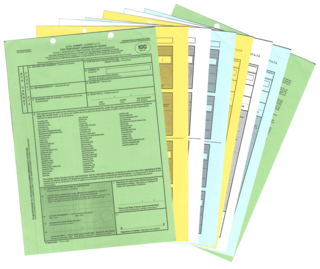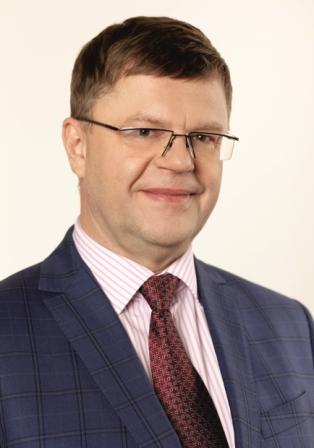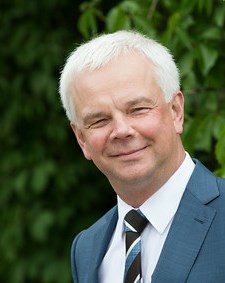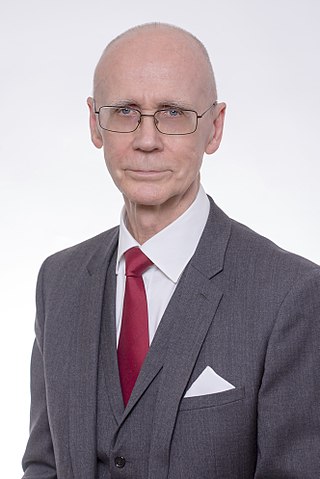The Republic of Estonia gained its independence from the Russian Empire on 24 February 1918 and established diplomatic relations with many countries via membership of the League of Nations. The forcible incorporation of Estonia into the Soviet Union in 1940 was not generally recognised by the international community and the Estonian diplomatic service continued to operate in some countries. Following the restoration of independence from the Soviet Union, Russia was one of the first nations to re-recognize Estonia's independence. Estonia's immediate priority after regaining its independence was the withdrawal of Russian forces from Estonian territory. In August 1994, this was completed. However, relations with Moscow have remained strained primarily because Russia decided not to ratify the border treaty it had signed with Estonia in 1999.

Konstantin Päts was an Estonian statesman and the country's president in 1938–1940. Päts was one of the most influential politicians of the independent democratic Republic of Estonia, and during the two decades prior to World War II he also served five times as the country's prime minister.

The ATA Carnet, often referred to as the "Passport for goods", is an international customs document that permits the tax-free and duty-free temporary export and import of nonperishable goods for up to one year. It consists of unified customs declaration forms which are prepared ready to use at every border crossing point. It is a globally accepted guarantee for customs duties and taxes which can replace the security deposit required by each customs authority. It can be used in multiple countries in multiple trips up to its one-year validity. The acronym ATA is a combination of French and English terms "Admission Temporaire/Temporary Admission". The ATA carnet is now the document most widely used by the business community for international operations involving temporary admission of goods.

The Swedish Business Awards were established in 2006. The project aims to provide positive examples for international establishments and business development by highlighting the success of cooperation, emphasizing innovativeness, outstanding business achievements and the importance of contributions to society. This initiative promotes internationalization of business and serves as a yearly meeting point to discuss achievements, practices and aims. Culmination of the project is the ceremony which includes presentations, discussions and awards for the most successful international and local companies operating in Lithuania, Latvia and Estonia.

The following outline is provided as an overview of and topical guide to Estonia:
Meelis Kubo is an Estonian magician.
Corporate chambers were a series of corporate institutions in Estonia during the interwar period. The first of these – the Chamber of Commerce and Industry – was created in 1924, and the second, the Chamber of Agriculture, followed in 1931. However, most of the chambers were established after the 1934 coup d'état of Konstantin Päts, and the Era of Silence which followed the coup became their heyday.
Gambling in Estonia is relatively young. While Estonia was a part of the USSR, all types of gambling activities were banned. Despite the prohibition, illegal casinos still functioned, but the real history of gambling started in 1994-1995 when the first Lottery Act of 1994 and the first Gambling Act of 1995 came into power. As the capitol, Tallinn has more casinos than any other Estonian town. As of September 2010, there were 33 casinos in Tallinn. That's 3 times less than in 2008, when 91 gambling venues operated in this city. According to experts, the main reasons for such decrease were the consequences of the crisis and the adoption of the new gambling law in 2008. The legal age for playing at casinos is 21.
Heinrich Gutkin was a trader and the Estonian National Assembly member.

Tullio Liblik is an Estonian entrepreneur, the CEO and member of the board of the investment company Saarte Investeering and the chairman of the council of Kuressaare Regional Training Centre.

Jüri Käo is one of the managers and shareholders at NG Investeeringud, which is an industry, retail trade and real estate investment group based on Estonian private capital and employs more than 4300 people.

Tullio Ilomets was an Estonian chemist, science historian and a volunteer in heritage protection.
PLMF Music Trust was inaugurated on 7 February 2003 to support the development of Estonian musicians by organizing master classes, opportunities to perform and by introducing them internationally. The founders of the trust decided to name it after the opera singer Pille Lill.

Kalle Kurg is an Estonian poet, writer, critic, translator and editor. As a versatile figure in Estonian culture, he has also published caricatures and worked as a theatre director.
Märt Rask is an Estonian attorney, jurist, and politician who was the Estonian Minister of the Interior from 1995 to 1996, as well as being the Justice Minister in 1992 and from 1999 to 2003 and Chief Justice of the Supreme Court of Estonia from 2004 to 2013.
Ants Mellik was an Estonian architect.

Chocolala OÜ is an Estonian confectionery company specialized in luxury handmade chocolate and small-batch, bean-to-bar products.
Leila Pärtelpoeg is an Estonian interior architect and pedagog.

Märt Põder is an Estonian philosopher, freedom of information activist, presenter, publicist and translator.

The Estonian Chamber of People with Disabilities, also translated as Estonian Chamber of Disabled People, is the largest association of people with disabilities in Estonia. The Chamber functions as a non-profit umbrella organization that represents various organizations of people with disabilities in Estonia since 1993. The objective of the activities of the Estonian Chamber of Persons with Disabilities is to improve the livelihoods, quality of life and social inclusion of people with disabilities.











